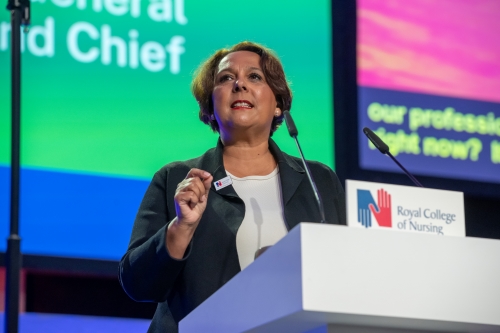Nurse shortages mean patients are ‘dying alone’ – RCN survey

Only a third of nursing staff feel they have enough registered nurses on shifts, according to a new survey carried out by the Royal College of Nursing (RCN).
The survey, which asked around 11,000 staff about their most recent shift, found that an overwhelming majority observed huge disparities between the planned number of registered nurses and the reality.
“It is dangerous to patients and demoralising for nursing staff”
Nicola Ranger
The lack of registered nurses led to overworked staff and, the RCN claimed, patients “dying alone” and “being left in pain”.
Just 32% of hospital and 36% of community nursing staff told the survey that their most recent shift had the planned number of registered nurses on it, with one in three hospital and four in 10 community nursing shifts missing “up to half” the planned number of registered nurses.
More than three-quarters (81%) of respondents told the survey, which was carried out in March, that there were not sufficient numbers of registered nurses to safely meet the needs of their patients.
A community nurse from the South of England spoke about the scale and impact of these gaps, saying: “We leave over 50 patients requiring nursing care unseen on a daily basis due to poor staffing levels.
“This leads to increases in hospital admissions and death. It is left to us to decide who gets seen and who gets missed, which is heartbreaking.”
Another nurse said: “I have not been able to sit with patients who are dying meaning they have been left to die alone. I have not had the time to make sure patients are fed properly and have adequate drinks.”
Other respondents to the RCN survey spoke about missed medication, personal care and pain relief as a result of the gaps.
Responses from nursing staff working in accident and emergency (A&E) painted a particularly dire picture, with almost a fifth (18%) saying they had more than 51 patients to care for in just one shift.
Similarly, around 15% of outpatient staff told the survey that they had a caseload of more than 51 patients in a single shift.
“It’s vital for patients that the government invests in the NHS workforce”
Saffron Cordery
The publication of RCN’s survey coincides with the one-year anniversary of the NHS Long Term Workforce Plan, which set ambitious goals for increasing the size and stability of the nursing workforce.
The RCN said nurses were still “demoralised”, due to the number of missing registered nursing posts from shifts.
Professor Nicola Ranger, acting general secretary and chief executive, said: “In every health and care setting, nursing staff are fighting a losing battle to keep patients safe.
“Without safety-critical limits on the maximum number of patients they can care for, nurses are being made responsible for dozens at a time, often with complex needs.
“It is dangerous to patients and demoralising for nursing staff,” said Professor Ranger, who took over as interim chief executive at the end of May.
“When patients cannot access safe care in the community, conditions worsen and they end up in hospital where workforce shortages are just as severe. This vicious cycle fails staff and patients – it cannot go on.”
Professor Ranger said investment in the workforce was “desperately” needed and reiterated RCN calls to make nurse-patient ratios a legal requirement in England, as they are in Wales and Scotland.
“That is how we improve care and stop patients coming to harm,” she added.
Saffron Cordery, chief executive of NHS Providers, which represents trusts, described the survey results as “worrying”.
She said: “Safety of patients is a top priority. Without enough of the right staff in the right places, safety and quality of care are compromised.
“A year on from publication of the NHS long-term workforce plan, trusts across England still have more than 100,000 vacancies and high levels of staff burnout.
“Careers across the NHS including in community health services must be rewarded adequately otherwise it’s hard to recruit and attract the people we need,” she said.
“An NHS fit for the future needs a thriving health and care workforce with more, meaningful investment in nursing education and training,” Ms Cordery said.
She added: “It’s vital for patients that the government invests in the NHS workforce.”






